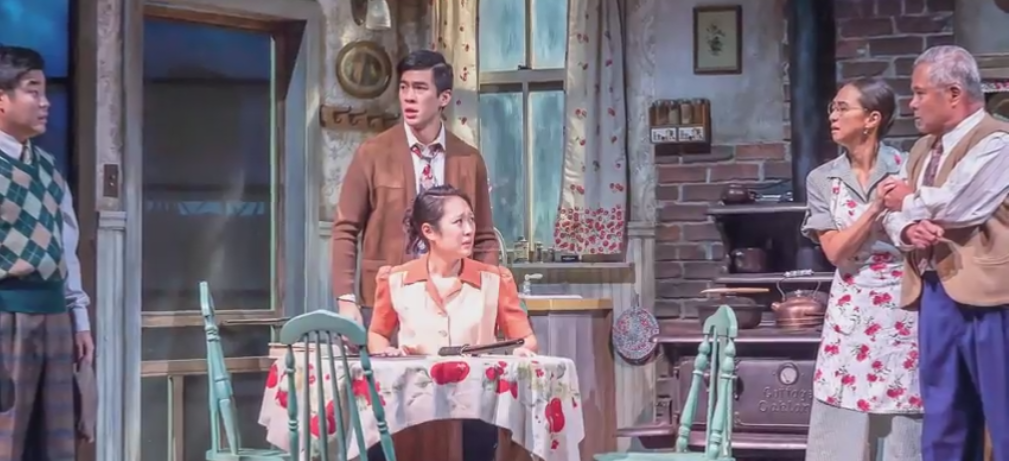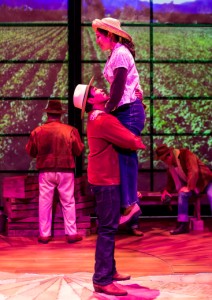
By Jana Monji
AsAmNews Contributor
Valley of the Heart is overstuffed with good intentions and inclusive impulses and the result is an overlong sincere essay that doesn’t quite touch the heart as it touches on too many topics.
That’s unfortunate because the dialogue about Latinos and Asians, particularly in California, is an important part of the American race dialogue that desperately needs to expand beyond Black and White. Certainly Luis Valdez caught an important moment in American history in his 1979 play, Zoot Suit, which looked at the same time frame. The Zoot Suit Riots were in June of 1943.
The thrust stage is backed but what looks like an oversized industrialized interpretations of shōji room dividers. These also function as screens to give us an overall setting and some photos of people. You might even recognized some of the faces (e.g. Toyo Miyatake). Opening night, the metaphorical stage was set by East Los Angeles Taiko performing in front of the Mark Taper Forum. About 10 minutes before curtain, three Latino male drummers went into the theater.
Valley of the Heart begins in 2001, with an elderly wheelchair-bound man, Benjamin Montaño aided by two kuroko (Mariela Arteaga and Michael Naydoe Pinedo) recalling the past. Then the action steps back to the winter of 1941 in California’s Santa Clara Valley. Two families live close to each other: the Montaño and the Yamaguchi. Montaño means “mountainous” in Spanish; Yamaguchi means “mountain entrance” in Japanese. It seems like literary fate that these two families will become interconnected.

Ichiro Yamaguchi (Randall Nakano) owns the land through his son, Joe “Yoshi” Yamaguchi (Justin Chien). Ichiro (which means eldest son) married his wife Hana (Joy Osmanski) by proxie and she was surprised to find out that her husband was so much older. He spent three years in Hawaii before coming to California where’s he’s been for 37 years. Ichiro has arranged for his daughter, Thelma “Teruko” (Melanie Arii Mah) to marry a college boy who’s not very keen on farms or farming, Calvin Sakamoto (Scott Keiji Takeda).
Working the fields, Thelma has caught the eye of Benjamin. Benjamin’s father Ernesto “Tito” Montaño (Moises Castro) is a tenant farmer with a wife Paula (Rose Portillo), daughter Maruca (Christy Sandoval) and younger son Cayetano Montaño (Daniel Valdez).

Thelma and Benjamin will have to contend with Calvin and her father’s traditional attitudes and, of course, it IS 1941 so history buffs will know that Pearl Harbor will soon be bombed and by spring California Japanese and Japanese Americans will be sent first to assembly centers and then to incarceration camps (in this case Heart Mountain).
Along the way, Valdez will touch on the anti-miscegenation laws (light-skinned Latinos were considered white), alien land laws, the No-No boys, braceros, the 442nd, segregation in the US military, samurai culture and music. It helps to have a smattering of Spanish and Japanese knowledge, but not necessary to understand what’s happening because there will be exposition, too much exposition for natural dialogue.
Despite the length and survey quality social history in this play, one interesting cross-cultural take away was that according to the Montaño family, the barracks in Heart Mountain were similar to the conditions they lived under as tenant farmers. One wonders how it was for the braceros.
Valley of the Heart is achingly earnest and could benefit from some judicial editing down and focusing in on specifics. Still, it is beautifully staged with scenic design by John Iacovelli and lighting by Pablo Santiago. The music under music consultant Daniel Valdez with original compositions and arrangements by PJ Hirabayashi and Roy Hirabayashi and additional arrangements by Noé Yaocoatl Montoya are really a wonderful blend of Japanese and Mexican influences.
Valley of the Heart is presented by the Center Theatre Group in association with El Teatro Campesino at the Mark Taper Forum. The production continues until December 9. For tickets and information, please visit CenterTheatreGroup.org or call (213) 628-2772.
AsAmNews has Asian America in its heart. We’re an all-volunteer effort of dedicated staff and interns. Check out our Twitter feed and Facebook page for more content. Please consider interning, joining our staff or submitting a story.

